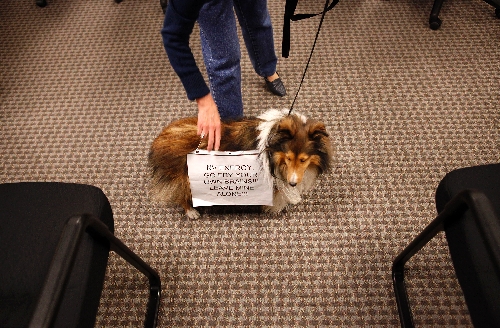Want out of NV Energy’s smart-meter initiative? It could cost you

It could cost you to opt out of NV Energy’s smart-meter initiative.
That’s according to a proposal the utility filed with the Public Utilities Commission of Nevada, which is looking at accommodating ratepayers who don’t want smart meters.
NV Energy’s solution, presented in a Dec. 28 filing, is to install digital smart meters stripped of radio-frequency communication capabilities, and charge fees for traditional manual meter reading.
How much NV Energy will ask for depends on whether the commission lets the utility install noncommunicating smart meters or makes the company keep using analog meters. Noncommunicating smart meters would come with a one-time charge of $110 in Southern Nevada, plus a monthly fee of $14.86. For analog meters, the one-time hit would be nearly $180, plus $14.04 each month.
Ratepayers have until noon Friday to file written comments with the commission if they want their thoughts registered for a Wednesday workshop designed to go over opt-out proposals.
Before you comment, though, here’s some background.
The commission in 2010 signed off on NV Energize, a $301 million program to replace NV Energy’s 1.45 million analog meters with digital models that send use details electronically to NV Energy and let the utility give consumers virtually real-time information on power consumption. The idea, said the company, was to create a “safer, more reliable, efficient and affordable system” — one that would save more than $35 million a year in meter-reading costs while encouraging ratepayers to use less power.
The company plans a dynamic-pricing trial for ratepayers willing to pay more for power during peak periods in exchange for lower prices during other times. The company now charges a flat fee, which doesn’t encourage conservation during high-use hours.
Through mid-December, about 1,400 consumers had asked to delay installation, and a commission workshop on Dec. 6 drew about 30 ratepayers concerned about health and privacy. They cited studies showing negative health effects, including slow memory, leukemia and hair loss, from exposure to radio frequencies. They also worry hackers could get power records and know when no one is home.
So the commission asked NV Energy for an opt-out plan, which will be up for debate at Wednesday’s workshop. State public utilities commissions in California, Maine and Oregon have ordered utilities to accommodate ratepayers who want to opt out.
To serve an estimated 4,500 opt-outs, NV Energy said it would have to keep five full-time meter readers statewide to check noncommunicating devices, plus back-office staff to develop new processes for interacting with customers.
The filing also notes that NV Energy has always had legal discretion to choose its meters. Plus, it has the legal right to replace or repair its meters and to access private property for any reason related to power delivery. Those regulations give the company the right to install smart meters, the filing said.
Lawmakers tacitly endorse technologies such as smart meters, the company argued, because Nevada Revised Statutes note that the state and ratepayers “have an interest in encouraging public utilities to promote and take actions toward energy conservation.”
The utility added that less than half a percent of ratepayers object to the meters, and because those consumers expressed “intent to interfere with or limit” the company’s legal metering rights, those ratepayers should bear the cost of installing and monitoring noncommunicating smart meters.
The filing also said it would be impractical to stick with analog meters for opt-outs. Analog meters don’t store power-use data, which goes against state and utility policies to promote conservation.
At Wednesday’s workshop, which starts at 9 a.m., commissioners will hear opt-out ideas from consumers. But only those who file written comments by noon Friday get five minutes to talk.
Comments may be filed in person at the commission’s office, at 9075 W. Diablo Drive, Suite 250. Ratepayers can also mail comments, or use the electronic filing system at puc.nv.gov. The commission will not accept e-mails or faxes.
NV Energy’s opt-out proposal is on the PUC website. Click “Docket Info,” go to “Electric Dockets” and choose Docket No. 11-10007.
Contact reporter Jennifer Robison at
jrobison@reviewjournal.com or 702-380-4512.